Expertise provided by Darius Smith
Reviewed by Chaster Johnson
Starting out in the stock market might seem overwhelming, for beginners. With so many choices and approaches, you must grasp the basics. Then, pick the stocks to start your investment. In this piece, we'll delve into the picks for novice investors, optimal trading tactics, and handy advice, on stock selection.
Why Beginners Should Avoid Investing in Complex Businesses
A key guideline, for investors is to steer of putting money into companies that are beyond your grasp. This suggestion is often linked to the renowned investor Warren Buffett. It highlights the importance of knowing and understanding the businesses you choose to invest in. Here's why:
Understanding Business Models
Investing in a company involves taking on a role, as an owner of the business. To make investment choices, you must grasp how the company makes profits. You must understand its strengths and the risks it faces. Some companies, like firms or high-tech startups, have complex business structures. They operate in specialized markets that can be hard for beginners to understand.
Assessing Financial Health
Analyzing a company's well-being is essential when deciding on investments. This includes examining documents such, as the income statement, balance sheet, and cash flow statement. Beginners may find it easier to begin with companies that have simple records to make the process less daunting.
Making Informed Decisions
You invest in companies that you understand. This helps you make decisions. You know the industry, market trends, and the company's performance. This boosts your confidence. Lowers the chances of making uninformed investment decisions.
The Importance of Financial Ratios
Investors analyze ratios to assess a company's well-being and success. These metrics offer views on parts of a company's activities. They show its profits and potential risks. Here are some key financial ratios that beginners should understand:
Price-to-Earnings (P/E) Ratio
A company's P/E ratio compares its share price to its, per-share earnings aiding investors in assessing if a stock is priced based on its earnings performance.
Dividend Yield
The dividend yield indicates how dividend income an investor may receive compared to the stocks price. It is crucial, for investors seeking income, from their investments.
Debt-to-Equity Ratio
A company's debt, to equity ratio shows how much of its funding comes from debt, versus equity with a ratio indicating financial stability.
Return on Equity (ROE)
A company's return on equity (ROE) indicates its profitability by showing the profit earned from shareholders' investments. This metric is crucial, for assessing performance.
Exploring these proportions could assist beginners in making informed choices when it comes to investing and assessing the risks and benefits of various stocks.
Characteristics of a Good Stock for Beginners
As a novice, in stock selection it's crucial to seek out traits that suggest reduced risk and consistent profits. Here are some key features to consider:
Low Volatility (Beta Less Than One)
Volatility pertains to how a stock’s price changes. Stocks that are highly volatile can have price fluctuations, which might be worrisome, for newbies. A stock with a beta than one usually shows volatility compared to the whole market making it a more secure option, for novice investors.
Reasonable Dividend
Receiving a dividend can offer a source of income and assist beginners in grasping the concept of dividend payments. Generally, dividends are distributed by established sound companies indicating a promising investment opportunity.
Familiar Company
Investing in companies that you know well can simplify grasping their business strategies, products and market standing. This familiarity might enhance your assurance. Support you in making informed investment choices.
Growing Earnings and Sales
Seek out businesses that have a history of increasing profits and sales. This suggests that the company is growing and earning income potentially resulting in stock values and greater returns, in the long run.
Types of Stocks for Beginners
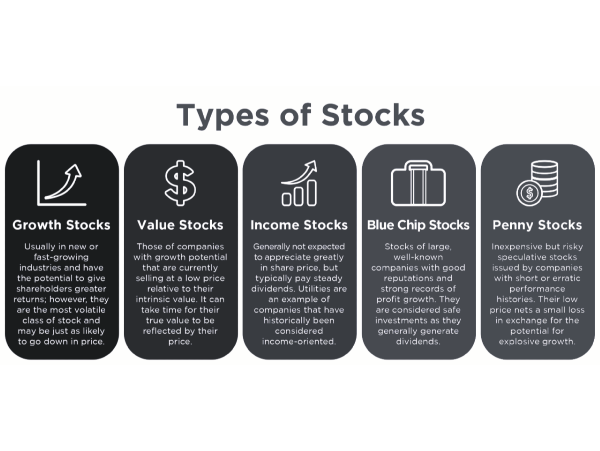 Source: Parsonsfcu
Source: Parsonsfcu
Beginners, to the stock market may want to explore stocks that provide stability, consistent growth, and reduced risk. Here are three types of stocks that are well-suited for beginners:
Industrial Stocks
Companies, in the sector are engaged in manufacturing, construction, and providing goods and services. These businesses typically enjoy earnings. Are less affected by market fluctuations. Some examples of industries, within this sector include machinery, aerospace, and defense companies.
Dividend Stocks
Investing in dividend stocks involves purchasing shares of companies that distribute dividends to their shareholders on a basis. These types of stocks offer a source of income. Generally exhibit lower levels of volatility compared to growth stocks. It is advisable for new investors to consider known companies with a track record of issuing dividends to those operating in sectors, like utilities or consumer staples.
Utility Stocks
Stocks, in the utility sector represent ownership of businesses offering services like electricity, water, and gas. These companies usually enjoy income. Are less vulnerable to economic downturns making them a reliable choice, for novice investors.
Why Penny Stocks Are Not Worth It for Beginners
Priced stocks, known as penny stocks represent shares, in companies that usually trade for less than $5 each. Although they may appear appealing for their affordability, they carry risks for those new, to investing. Here's why penny stocks are not a good investment for novice investors:
High Volatility and Risk
Priced stocks, commonly referred to as penny stocks are notorious, for their nature and associated risks. The value of these stocks can experience fluctuations primarily driven by speculation, than the actual performance of the underlying businesses. As a result novice investors may face losses when dealing with such investments.
Lack of Information
Numerous priced stocks are often not included on stock markets and might not have to adhere to the same strict regulations, as bigger corporations. This limited transparency can create difficulties, in obtaining details regarding the company's status and operational activities.
Speculative Nature
Priced stocks are frequently influenced by gossip and speculation of strong business foundations. This speculative aspect can result in market manipulation and deceitful practices rendering them an option, for novices.
Limited Growth Potential
Investing in priced stocks might offer big returns but most of them won't. Putting money into these stocks could lead to losses without giving you the solid investment know how required for lasting success.
The Best Type of Trading for Beginners
When it comes to trading, beginners should focus on strategies that offer lower risk and require less time commitment. Here are the two main types of trading and their suitability for beginners:
Long-Term Investing
Investing for the term entails purchasing and retaining stocks over a duration often spanning several years. This approach enables investors to capitalize on the growth of the companies they have invested in. Here are some reasons why long-term investing is ideal for beginners:
Less Time-Consuming
Investing over the term involves frequent monitoring and decision-making when contrasted with active trading methods such, as day trading. This approach is ideal, for beginners who may lack the availability or expertise needed for trading.
Lower Transaction Costs
Engaging in trades may lead to increased expenses, from charges. Opting for long-term investments can reduce these costs enabling a portion of your funds to remain invested and increase gradually.
Reduced Stress
Investors who think long-term tend to be influenced by the ups and downs of the market in the run. This approach can help minimize anxiety and impulsive decision-making that often come with trading allowing beginners to maintain their attention on their investment objectives.
Day Trading
Day trading is the practice of purchasing and selling stocks on the day to capitalize on short term price fluctuations. Although it can be lucrative its generally advised against for beginners due, to reasons:
High Risk
Day trading carries a level of risk that is considered speculative. Those new, to the practice may find it challenging to navigate the paced nature of this environment potentially resulting in financial losses.
Time Commitment
Successful day trading requires constant monitoring of the market and quick decision-making. This can be demanding and time-consuming, making it unsuitable for beginners with limited time and experience.
Psychological Pressure
The fast-paced nature of day trading can create psychological pressure and stress. Beginners may find it challenging to manage their emotions and make rational decisions under these conditions.
How to Choose Which Stock to Buy for Beginners

Selecting the right stocks can be overwhelming for beginners. Here are some practical tips to help you make informed decisions:
Use a Stock Selection Guide
A stock selection guide can help beginners evaluate and compare different stocks based on specific criteria. These guides often include financial ratios, company fundamentals, and industry analysis, providing a comprehensive overview to aid in decision-making.
Adopt a Value Investing Strategy
Value investing involves selecting stocks that appear to be undervalued based on fundamental analysis. This strategy focuses on finding high-quality companies trading at a discount to their intrinsic value. Key principles of value investing include:
Look for Undervalued Stocks
Identify stocks trading at prices lower than their intrinsic value. This requires analyzing financial statements, earnings reports, and other fundamental data to assess the company's true worth.
Focus on Quality Companies
Invest in companies with strong financial health, competitive advantages, and a history of stable earnings and growth. These companies are more likely to provide steady returns over the long term.
Be Patient
Value investing requires patience and a long-term perspective. It may take time for the market to recognize the true value of an undervalued stock, but the potential rewards can be significant.
Research and Analysis
Thorough research and analysis are essential for making informed investment decisions. Here are some steps to follow:
Study Financial Statements
Review a company's financial statements, including the income statement, balance sheet, and cash flow statement. These documents provide crucial information about a company's financial health, profitability, and operational efficiency.
Analyze Industry Trends
Understand the industry in which the company operates. Analyze market trends, competitive landscape, and potential growth opportunities. This can provide insights into the company's future prospects and help you assess whether it is well-positioned for long-term success.
Evaluate Management
The quality of a company's management team can significantly impact its performance. Look for experienced leaders with a proven track record of making sound business decisions and driving growth. Management's strategic vision and execution capabilities are critical factors in a company's success.
Consider Economic Factors
Economic conditions can affect a company's performance. Stay informed about macroeconomic trends, interest rates, inflation, and other factors that could impact the stock market and the specific industries you are interested in. This broader perspective can help you make more informed investment choices.
Additional Tips for Beginner Investors
In addition to the guidelines above, here are some additional tips to help beginners navigate the stock market:
Diversify Your Portfolio
Diversification involves spreading your investments across different asset classes, industries, and geographic regions to reduce risk. By diversifying your portfolio, you can mitigate the impact of poor performance from any single investment and achieve more stable returns.
Start with Index Funds or ETFs
Index funds and exchange-traded funds (ETFs) are excellent options for beginners. These funds invest in a broad range of stocks, providing instant diversification and reducing the risk associated with individual stock picking. They also have lower fees and are easier to manage than a portfolio of individual stocks.
Invest Regularly
Adopting a regular investment schedule, known as dollar-cost averaging, can help you build wealth over time. By investing a fixed amount regularly, regardless of market conditions, you can reduce the impact of market volatility and benefit from the compounding effect of reinvested earnings.
Keep Emotions in Check
Emotions can play a significant role in investment decisions. Fear and greed can lead to impulsive actions, such as panic selling during market downturns or chasing high-flying stocks. It's essential to stay disciplined, stick to your investment plan, and avoid making decisions based on short-term market movements.
Continue Learning
The stock market is constantly evolving, and staying informed is crucial for long-term success. Read books, attend seminars, follow financial news, and consider joining investment clubs or online communities to learn from experienced investors and share insights.
Set Clear Goals
Define your investment goals and time horizon. Are you saving for retirement, a down payment on a house, or a child's education? Your goals will influence your investment strategy and risk tolerance. Having clear objectives can help you stay focused and make more strategic decisions.
Monitor Your Investments
Regularly review your investment portfolio to ensure it aligns with your goals and risk tolerance. Rebalance your portfolio as needed to maintain your desired asset allocation and take advantage of new investment opportunities.
Conclusion
Getting started with investing can be a step, for beginners who want to establish a financial foundation for the future. Focus on stocks of companies that pay dividends. Also, choose industries you know well. This lowers risk and raises your chances of success. Term and value investing are proven methods. They can help beginners reach their financial goals. This is without the pressure of active trading.
New investors should avoid penny stocks. They should diversify their investments and use indicators to assess companies. It's also important to stay disciplined. Keep learning and check your investments often. This will lead to long-term success in the stock market.
Watch this video for more information:
https://youtu.be/v_Nhm-nr7J8






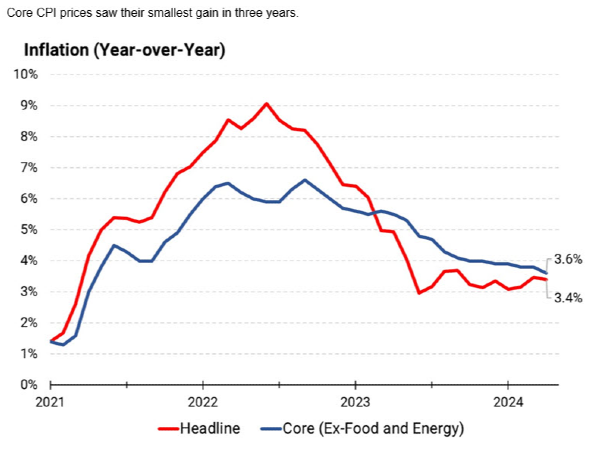






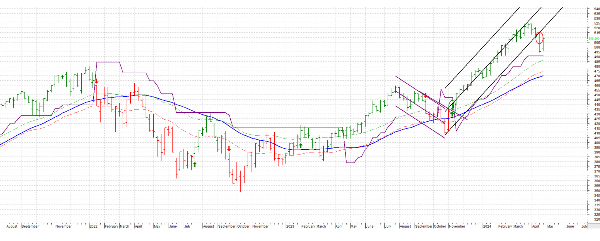


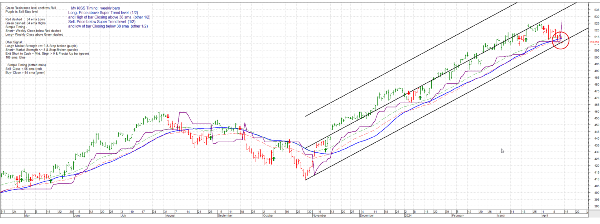




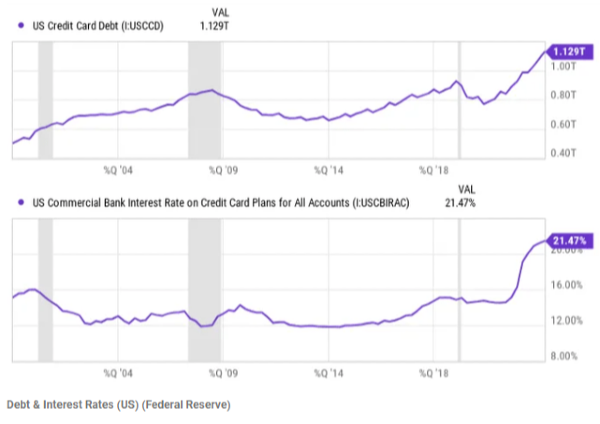
Expertise provided by Darius Smith
Reviewed by Chaster Johnson
Starting out in the stock market might seem overwhelming, for beginners. With so many choices and approaches, you must grasp the basics. Then, pick the stocks to start your investment. In this piece, we'll delve into the picks for novice investors, optimal trading tactics, and handy advice, on stock selection.
Why Beginners Should Avoid Investing in Complex Businesses
A key guideline, for investors is to steer of putting money into companies that are beyond your grasp. This suggestion is often linked to the renowned investor Warren Buffett. It highlights the importance of knowing and understanding the businesses you choose to invest in. Here's why:
Understanding Business Models
Investing in a company involves taking on a role, as an owner of the business. To make investment choices, you must grasp how the company makes profits. You must understand its strengths and the risks it faces. Some companies, like firms or high-tech startups, have complex business structures. They operate in specialized markets that can be hard for beginners to understand.
Assessing Financial Health
Analyzing a company's well-being is essential when deciding on investments. This includes examining documents such, as the income statement, balance sheet, and cash flow statement. Beginners may find it easier to begin with companies that have simple records to make the process less daunting.
Making Informed Decisions
You invest in companies that you understand. This helps you make decisions. You know the industry, market trends, and the company's performance. This boosts your confidence. Lowers the chances of making uninformed investment decisions.
The Importance of Financial Ratios
Investors analyze ratios to assess a company's well-being and success. These metrics offer views on parts of a company's activities. They show its profits and potential risks. Here are some key financial ratios that beginners should understand:
Price-to-Earnings (P/E) Ratio
A company's P/E ratio compares its share price to its, per-share earnings aiding investors in assessing if a stock is priced based on its earnings performance.
Dividend Yield
The dividend yield indicates how dividend income an investor may receive compared to the stocks price. It is crucial, for investors seeking income, from their investments.
Debt-to-Equity Ratio
A company's debt, to equity ratio shows how much of its funding comes from debt, versus equity with a ratio indicating financial stability.
Return on Equity (ROE)
A company's return on equity (ROE) indicates its profitability by showing the profit earned from shareholders' investments. This metric is crucial, for assessing performance.
Exploring these proportions could assist beginners in making informed choices when it comes to investing and assessing the risks and benefits of various stocks.
Characteristics of a Good Stock for Beginners
As a novice, in stock selection it's crucial to seek out traits that suggest reduced risk and consistent profits. Here are some key features to consider:
Low Volatility (Beta Less Than One)
Volatility pertains to how a stock’s price changes. Stocks that are highly volatile can have price fluctuations, which might be worrisome, for newbies. A stock with a beta than one usually shows volatility compared to the whole market making it a more secure option, for novice investors.
Reasonable Dividend
Receiving a dividend can offer a source of income and assist beginners in grasping the concept of dividend payments. Generally, dividends are distributed by established sound companies indicating a promising investment opportunity.
Familiar Company
Investing in companies that you know well can simplify grasping their business strategies, products and market standing. This familiarity might enhance your assurance. Support you in making informed investment choices.
Growing Earnings and Sales
Seek out businesses that have a history of increasing profits and sales. This suggests that the company is growing and earning income potentially resulting in stock values and greater returns, in the long run.
Types of Stocks for Beginners
Beginners, to the stock market may want to explore stocks that provide stability, consistent growth, and reduced risk. Here are three types of stocks that are well-suited for beginners:
Industrial Stocks
Companies, in the sector are engaged in manufacturing, construction, and providing goods and services. These businesses typically enjoy earnings. Are less affected by market fluctuations. Some examples of industries, within this sector include machinery, aerospace, and defense companies.
Dividend Stocks
Investing in dividend stocks involves purchasing shares of companies that distribute dividends to their shareholders on a basis. These types of stocks offer a source of income. Generally exhibit lower levels of volatility compared to growth stocks. It is advisable for new investors to consider known companies with a track record of issuing dividends to those operating in sectors, like utilities or consumer staples.
Utility Stocks
Stocks, in the utility sector represent ownership of businesses offering services like electricity, water, and gas. These companies usually enjoy income. Are less vulnerable to economic downturns making them a reliable choice, for novice investors.
Why Penny Stocks Are Not Worth It for Beginners
Priced stocks, known as penny stocks represent shares, in companies that usually trade for less than $5 each. Although they may appear appealing for their affordability, they carry risks for those new, to investing. Here's why penny stocks are not a good investment for novice investors:
High Volatility and Risk
Priced stocks, commonly referred to as penny stocks are notorious, for their nature and associated risks. The value of these stocks can experience fluctuations primarily driven by speculation, than the actual performance of the underlying businesses. As a result novice investors may face losses when dealing with such investments.
Lack of Information
Numerous priced stocks are often not included on stock markets and might not have to adhere to the same strict regulations, as bigger corporations. This limited transparency can create difficulties, in obtaining details regarding the company's status and operational activities.
Speculative Nature
Priced stocks are frequently influenced by gossip and speculation of strong business foundations. This speculative aspect can result in market manipulation and deceitful practices rendering them an option, for novices.
Limited Growth Potential
Investing in priced stocks might offer big returns but most of them won't. Putting money into these stocks could lead to losses without giving you the solid investment know how required for lasting success.
The Best Type of Trading for Beginners
When it comes to trading, beginners should focus on strategies that offer lower risk and require less time commitment. Here are the two main types of trading and their suitability for beginners:
Long-Term Investing
Investing for the term entails purchasing and retaining stocks over a duration often spanning several years. This approach enables investors to capitalize on the growth of the companies they have invested in. Here are some reasons why long-term investing is ideal for beginners:
Less Time-Consuming
Investing over the term involves frequent monitoring and decision-making when contrasted with active trading methods such, as day trading. This approach is ideal, for beginners who may lack the availability or expertise needed for trading.
Lower Transaction Costs
Engaging in trades may lead to increased expenses, from charges. Opting for long-term investments can reduce these costs enabling a portion of your funds to remain invested and increase gradually.
Reduced Stress
Investors who think long-term tend to be influenced by the ups and downs of the market in the run. This approach can help minimize anxiety and impulsive decision-making that often come with trading allowing beginners to maintain their attention on their investment objectives.
Day Trading
Day trading is the practice of purchasing and selling stocks on the day to capitalize on short term price fluctuations. Although it can be lucrative its generally advised against for beginners due, to reasons:
High Risk
Day trading carries a level of risk that is considered speculative. Those new, to the practice may find it challenging to navigate the paced nature of this environment potentially resulting in financial losses.
Time Commitment
Successful day trading requires constant monitoring of the market and quick decision-making. This can be demanding and time-consuming, making it unsuitable for beginners with limited time and experience.
Psychological Pressure
The fast-paced nature of day trading can create psychological pressure and stress. Beginners may find it challenging to manage their emotions and make rational decisions under these conditions.
How to Choose Which Stock to Buy for Beginners
Selecting the right stocks can be overwhelming for beginners. Here are some practical tips to help you make informed decisions:
Use a Stock Selection Guide
A stock selection guide can help beginners evaluate and compare different stocks based on specific criteria. These guides often include financial ratios, company fundamentals, and industry analysis, providing a comprehensive overview to aid in decision-making.
Adopt a Value Investing Strategy
Value investing involves selecting stocks that appear to be undervalued based on fundamental analysis. This strategy focuses on finding high-quality companies trading at a discount to their intrinsic value. Key principles of value investing include:
Look for Undervalued Stocks
Identify stocks trading at prices lower than their intrinsic value. This requires analyzing financial statements, earnings reports, and other fundamental data to assess the company's true worth.
Focus on Quality Companies
Invest in companies with strong financial health, competitive advantages, and a history of stable earnings and growth. These companies are more likely to provide steady returns over the long term.
Be Patient
Value investing requires patience and a long-term perspective. It may take time for the market to recognize the true value of an undervalued stock, but the potential rewards can be significant.
Research and Analysis
Thorough research and analysis are essential for making informed investment decisions. Here are some steps to follow:
Study Financial Statements
Review a company's financial statements, including the income statement, balance sheet, and cash flow statement. These documents provide crucial information about a company's financial health, profitability, and operational efficiency.
Analyze Industry Trends
Understand the industry in which the company operates. Analyze market trends, competitive landscape, and potential growth opportunities. This can provide insights into the company's future prospects and help you assess whether it is well-positioned for long-term success.
Evaluate Management
The quality of a company's management team can significantly impact its performance. Look for experienced leaders with a proven track record of making sound business decisions and driving growth. Management's strategic vision and execution capabilities are critical factors in a company's success.
Consider Economic Factors
Economic conditions can affect a company's performance. Stay informed about macroeconomic trends, interest rates, inflation, and other factors that could impact the stock market and the specific industries you are interested in. This broader perspective can help you make more informed investment choices.
Additional Tips for Beginner Investors
In addition to the guidelines above, here are some additional tips to help beginners navigate the stock market:
Diversify Your Portfolio
Diversification involves spreading your investments across different asset classes, industries, and geographic regions to reduce risk. By diversifying your portfolio, you can mitigate the impact of poor performance from any single investment and achieve more stable returns.
Start with Index Funds or ETFs
Index funds and exchange-traded funds (ETFs) are excellent options for beginners. These funds invest in a broad range of stocks, providing instant diversification and reducing the risk associated with individual stock picking. They also have lower fees and are easier to manage than a portfolio of individual stocks.
Invest Regularly
Adopting a regular investment schedule, known as dollar-cost averaging, can help you build wealth over time. By investing a fixed amount regularly, regardless of market conditions, you can reduce the impact of market volatility and benefit from the compounding effect of reinvested earnings.
Keep Emotions in Check
Emotions can play a significant role in investment decisions. Fear and greed can lead to impulsive actions, such as panic selling during market downturns or chasing high-flying stocks. It's essential to stay disciplined, stick to your investment plan, and avoid making decisions based on short-term market movements.
Continue Learning
The stock market is constantly evolving, and staying informed is crucial for long-term success. Read books, attend seminars, follow financial news, and consider joining investment clubs or online communities to learn from experienced investors and share insights.
Set Clear Goals
Define your investment goals and time horizon. Are you saving for retirement, a down payment on a house, or a child's education? Your goals will influence your investment strategy and risk tolerance. Having clear objectives can help you stay focused and make more strategic decisions.
Monitor Your Investments
Regularly review your investment portfolio to ensure it aligns with your goals and risk tolerance. Rebalance your portfolio as needed to maintain your desired asset allocation and take advantage of new investment opportunities.
Conclusion
Getting started with investing can be a step, for beginners who want to establish a financial foundation for the future. Focus on stocks of companies that pay dividends. Also, choose industries you know well. This lowers risk and raises your chances of success. Term and value investing are proven methods. They can help beginners reach their financial goals. This is without the pressure of active trading.
New investors should avoid penny stocks. They should diversify their investments and use indicators to assess companies. It's also important to stay disciplined. Keep learning and check your investments often. This will lead to long-term success in the stock market.
Watch this video for more information:
https://youtu.be/v_Nhm-nr7J8